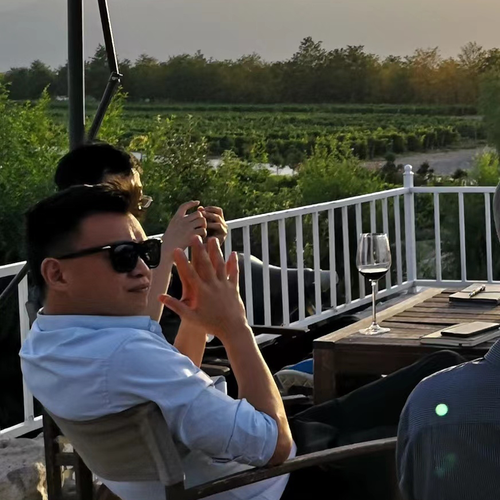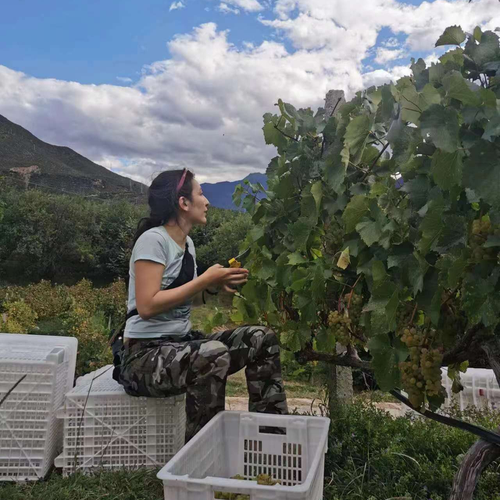To appreciate a glass of wine is to appreciate the environment from which it comes. This wine tasting focuses on two brands of Chinese wines from different regions of China. Harmene and Xiaoling Wines will guide the group to understand the complex history and culture of Chinese wines. We will taste three types of wine, coming from Harmene's vineyard in Ningxia and Xiaoling's vineyard in Yunnan, each with a unique regional taste.
Ticket price includes the full tasting flight and snacks. Attendees will get one glass of each: Harmene Cuvée Blanc, Harmene Cabernet and Sentiers de Xiaoling.
See below for an interview with our two speakers.
---------------------------------
Do you know what goes into your favorite bottle of wine? Part of appreciating wine is appreciating where it comes from, especially when it comes to China's unique wine brands and flavors. Coquina Restrepo asked our two wine experts to discuss how the climate, geography and culture of winemaking creates each brand's signature taste.
What made you start appreciating wine?
O: I think I had my first taste of wine around 12 years old. I was curious and a bit of a risk-taker at that age. However, my real appreciation for wine began when I started traveling for my career. At most meals, there was some form of wine, especially in Europe where I was introduced to a wider variety of flavors. Just like exploring food, the more I tasted, the more I learned, and it's just about finding your own palate.
Melanie: As a French girl growing up between Shanghai and France, I've always been around wine and it's a part of my background. As a kid of course, I hated it and would always make faces when my father would ask if I wanted to try a drop from his glass. I started drinking later as a student, but more casual. Until one day I tried a Chassagne-Montrachet 1er cru and I went "Oh, wine can be like that too!" And that's when I wanted to learn more about it and dived into this world.
How did you first start learning about wine and winemaking?
O: I know what I like in wine and can describe it well, which is important during the feedback stage. I am fortunate to have strong partners and a team that includes winemakers who are experts in their craft and make delicious wines.
M: I love talking with my father and the winemaking team at Xiaoling about how to make wine and the crop season this year. It's such a complex process! Another winemaker on our team once told me that he saw his job more as a doctor. As long as all goes well, he is not needed, and nature can do a great job on its own. But he's there to manage things in case it starts going wrong, and there is so much things that can go wrong! I am amazed at the precision that goes into making a great wine.
Why did you choose to start your brands?
O: We decided to start Harmene because we saw an opportunity for disruption in the wine industry. We wanted to create a world-class wine in a region that had not yet been recognized for its potential. We also saw that China was importing far more wine than it was exporting. This didn't make sense to us, given that China has some of the most fertile land in the world, not to mention the staggering carbon footprint of shipping wine long distances. From a business perspective, it made sense to produce wine in China, where our consumers were already located. This was also a natural extension of our existing wine business, Justgrapes, and its distribution partners. Finally, we wanted to create a wine that was both delicious and accessible. We wanted people to be able to enjoy our wine on a regular basis, and to create their own "Harmene moments."
M: It all started with a trip where my dad and I went hiking in the upper-Mekong Valley area in 2012, and we just fell in love with the region and the people there. It was a very poor and remote region at the time. And it still is, although it's changed and developed a lot in the past 10 years. With a few other lovers of the region, we gathered and brainstormed about what we could do to help the local population. We thought about several things, but wine came out as quite a natural candidate, with our backgrounds and the local history.
Why did you choose this particular region to make wine? Is there anything special about it?
O: Ningxia is at the tip of the Gobi Desert and it's located in the middle of the Yellow River Valley. It's mind-blowing that we're growing wine in such a geographically diverse area. The mix of acrid land and river currents gives the region a unique terroir, which is the combination of climate, soil, and other factors that influence the character of wine. Think about all the natural elements and human touches that come together to produce this amazing wine. That's another Harmene moment, when narratives come together into a singularity. From a technical perspective, the climate in Ningxia is ideal for growing grapes. The region has extreme temperatures, with hot summers and freezing winters. These temperatures kill off pests and fungus, so we don't need to use insecticides or pesticides. The soil in Ningxia is rich in minerals and nutrients, which helps to produce grapes with high levels of acidity and tannins. These characteristics are important for making red wine.
M: Our initial goal was to start economic development projects that preserved the local ecology in the region. Winemaking came naturally to the region since French missionaries had planted grapes there hundreds of years ago, and in 2017 we were hiring wine markets who began training local wine makers and cultivating old grapes into new vineyards. And this was indeed because we found this region unique and special. First, the landscapes are absolutely breathtaking. But mostly, this place is inhabited by Catholic Tibetans, which is not a combination most people would usually make. This means that they have a very unique culture that we related to.
What makes Chinese wine special to you?
O: Harmene wine is special to us because it is a product that we created to represent hard work, dedication, and steadfastness. It is a reminder to celebrate the human spirit and individual achievement in finding moments of happiness and peace during our short, transient life time.
M: For me, what makes Chinese wine so special is the adventure. We are pioneers in this field where everything is still to be done. It's a lot of work, but also exciting. There is so much possibilities and potential. Also, as a bi-cultural kid, I've always strived to make a bridge between China and France. And I find that making wine, which is still very linked to France in people's imagination, in China, is a great way to achieve that.
Speakers
Tickets
RAS China joint/family member
RMB 180
Public Price
Buy TicketFor members who signed up under the joint/family option.
Members of other RAS branches (Beijing, Hong Kong, Korea, etc.)
RMB 180
Public Price
Buy TicketFor members of other RAS branches and chapters.
You may be asked to provide proof of membership.


